【中考夺分天天练】2015届中考英语(人教版)总复习 第一篇 基础巧过关 :七年级下册 [Units 1—6](共42张PPT)
文档属性
| 名称 | 【中考夺分天天练】2015届中考英语(人教版)总复习 第一篇 基础巧过关 :七年级下册 [Units 1—6](共42张PPT) | 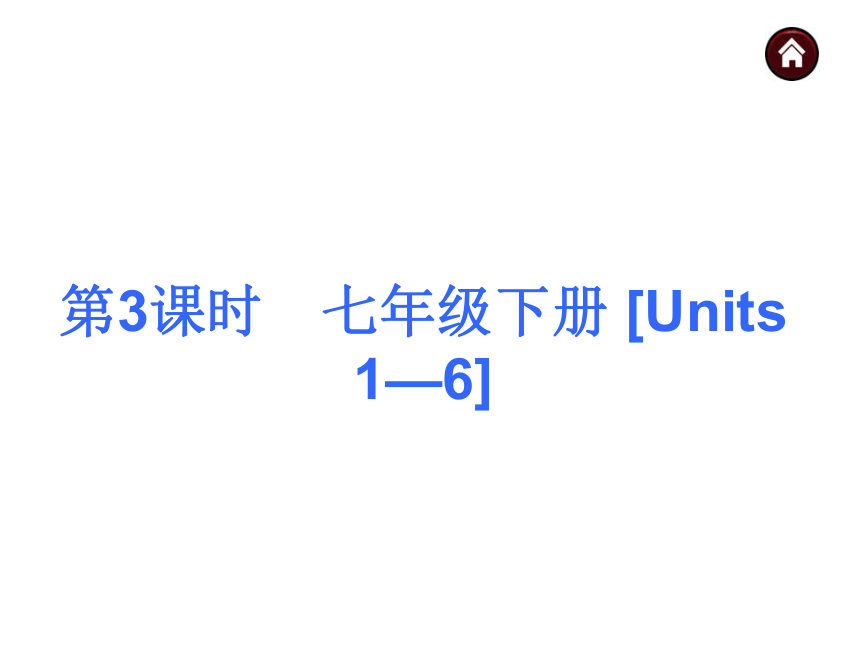 | |
| 格式 | zip | ||
| 文件大小 | 39.6KB | ||
| 资源类型 | 教案 | ||
| 版本资源 | 通用版 | ||
| 科目 | 英语 | ||
| 更新时间 | 2014-12-05 06:40:42 | ||
图片预览

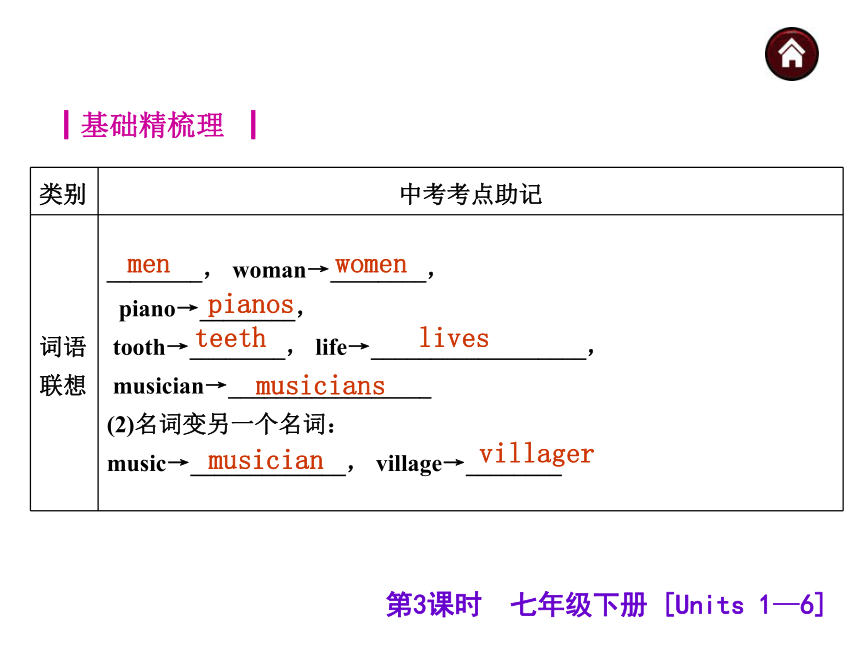
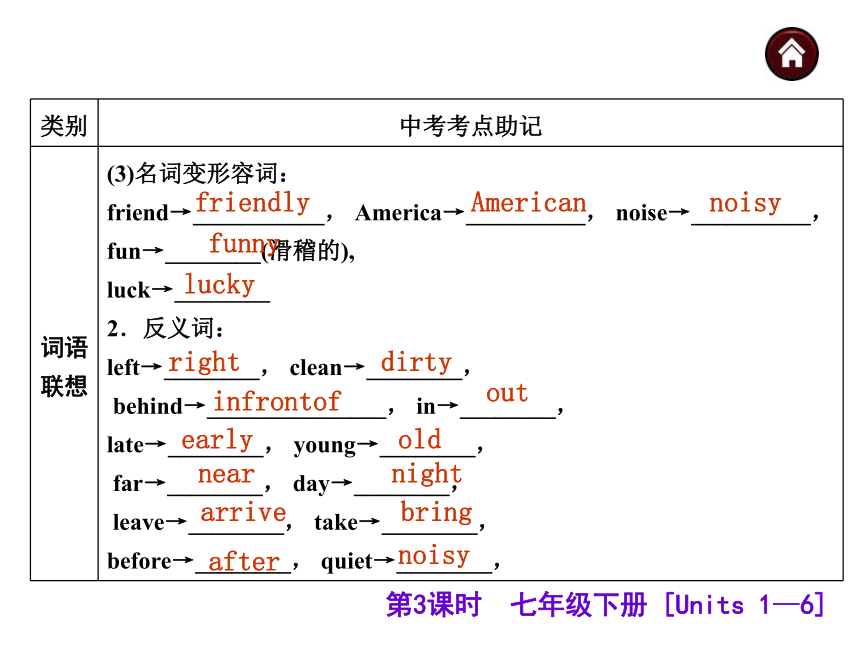
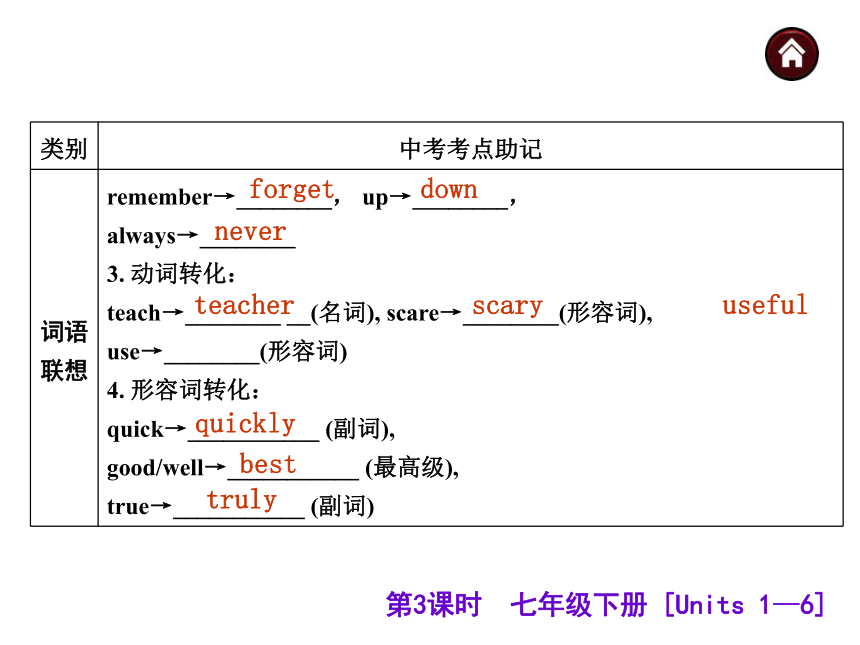
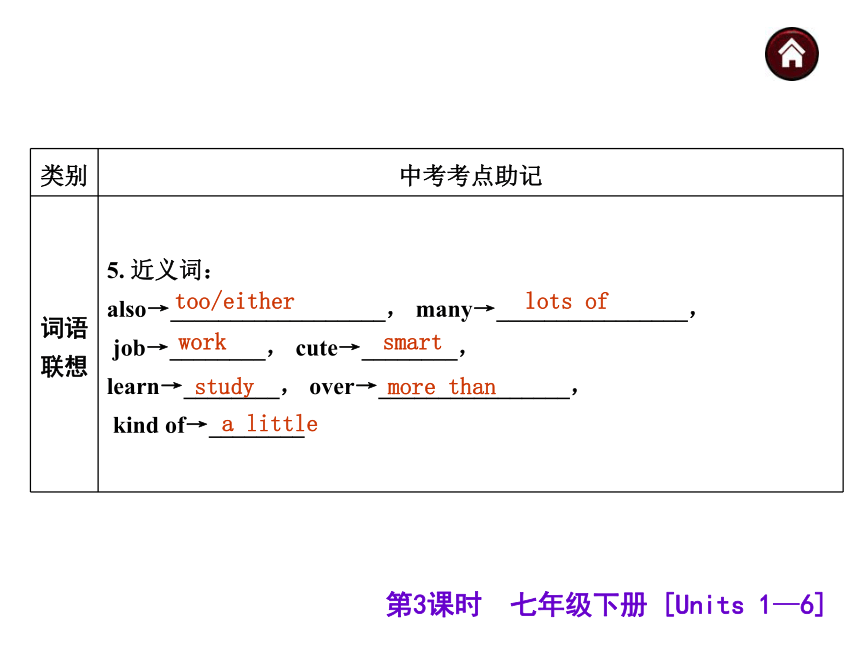
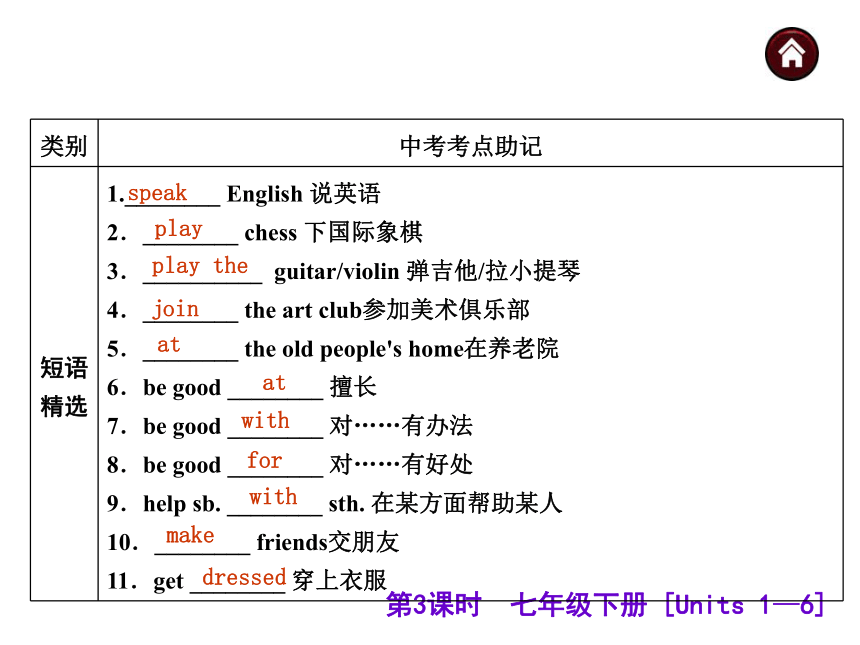
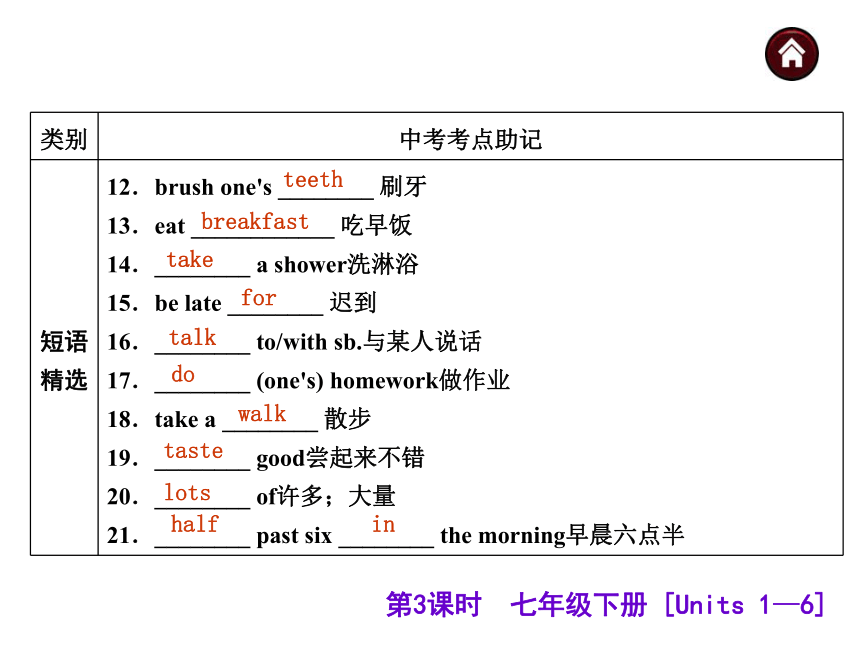
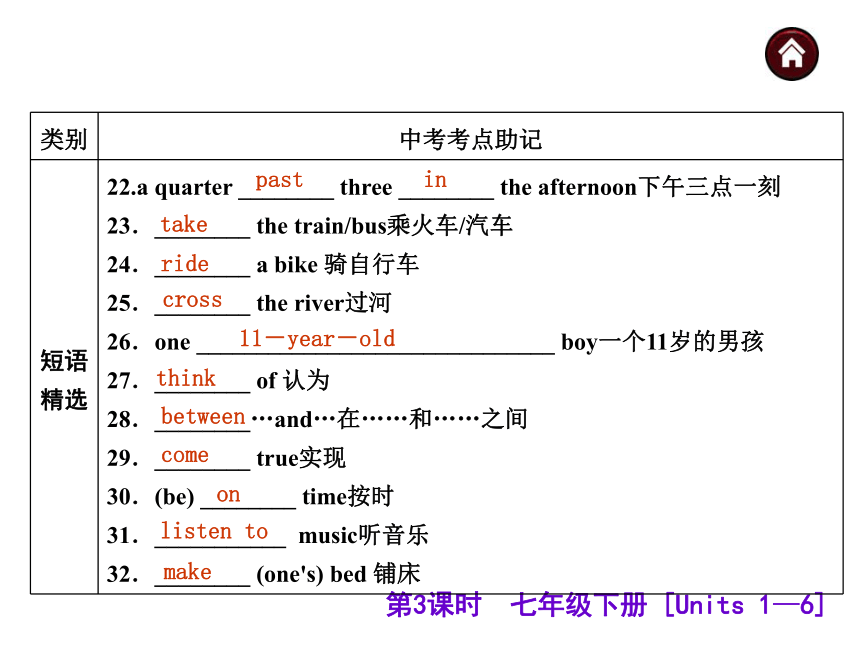
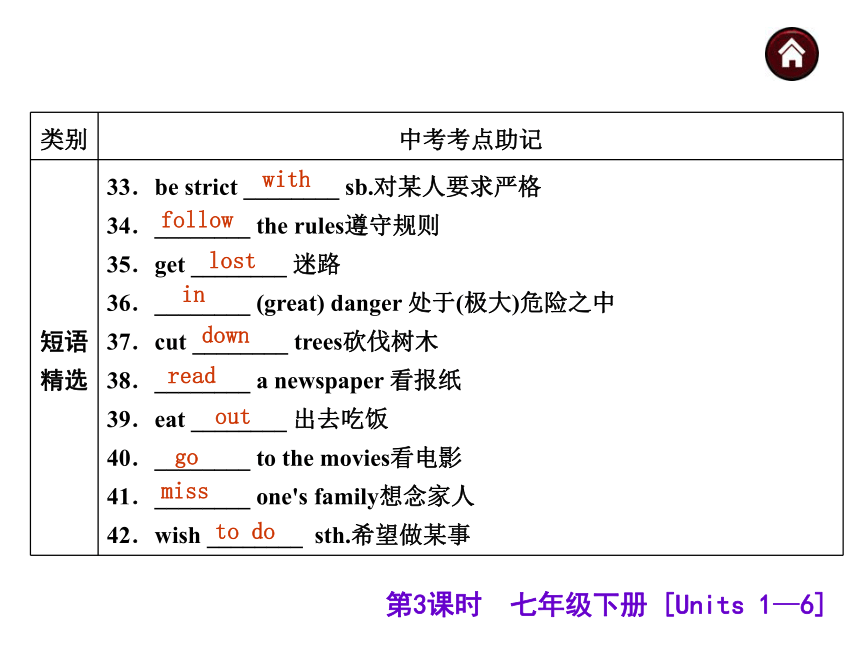
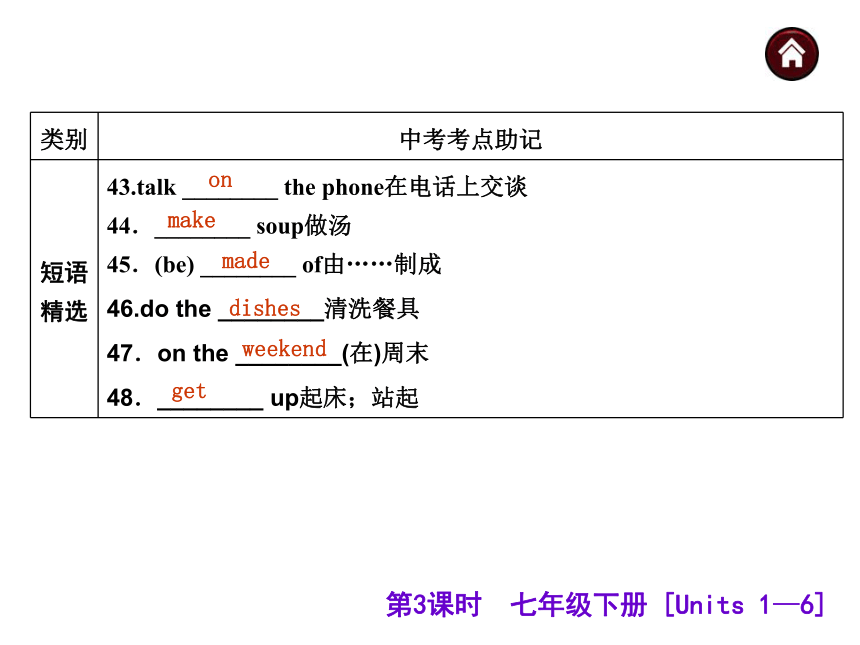
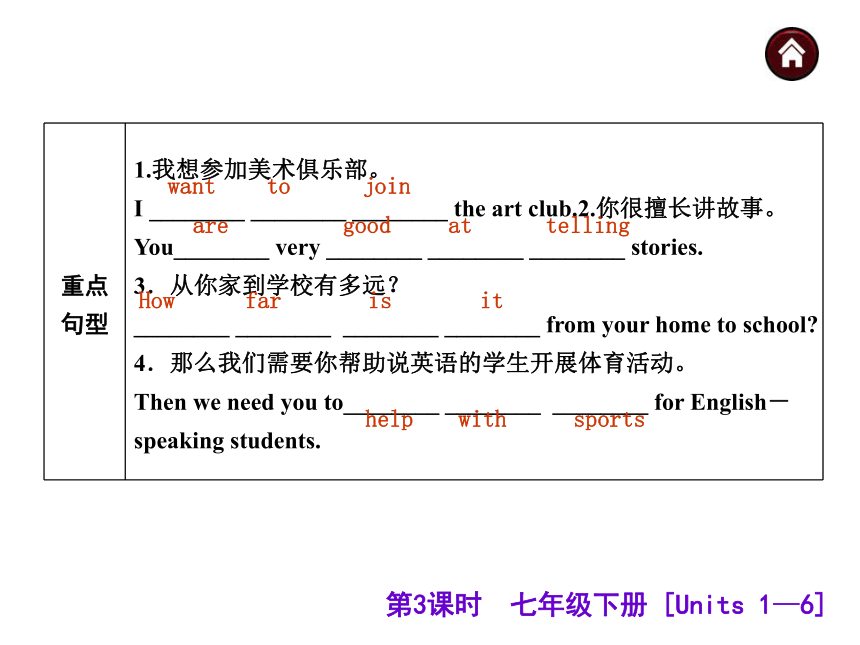
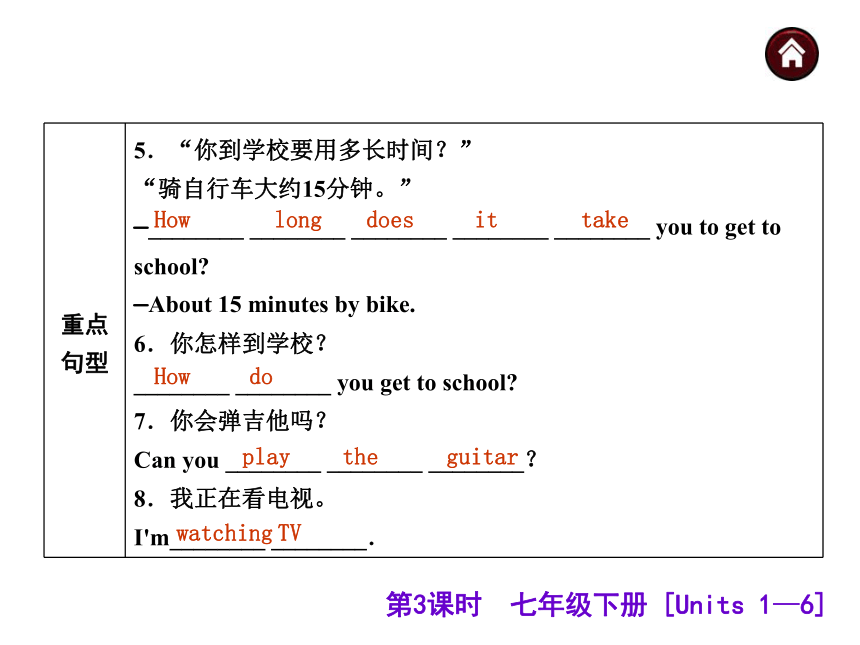
文档简介
课件42张PPT。第3课时 七年级下册 [Units 1—6]第3课时 七年级下册 [Units 1—6]┃基础精梳理 ┃men womenpianosteethlivesmusiciansmusicianvillager第3课时 七年级下册 [Units 1—6]friendlyAmericannoisyfunnyluckyrightdirtyinfrontofoutearlyoldnearnightarrivebringafternoisy第3课时 七年级下册 [Units 1—6]forgetdownneverteacherscaryusefulquicklybesttruly第3课时 七年级下册 [Units 1—6]too/eitherlots ofworksmartstudymore thana little第3课时 七年级下册 [Units 1—6]speakplayplay thejoinatatwithforwithmakedressed第3课时 七年级下册 [Units 1—6]teethbreakfasttakefortalkdowalktastelotshalfin第3课时 七年级下册 [Units 1—6]pastintake ride cross 11-year-old thinkbetweencomeonlisten tomake第3课时 七年级下册 [Units 1—6]withfollowlostindownreadoutgomissto do第3课时 七年级下册 [Units 1—6]onmakemadedishesweekendget第3课时 七年级下册 [Units 1—6]
wanttojoinaregoodattellingHowfaris ithelpwithsports第3课时 七年级下册 [Units 1—6]
HowlongdoesittakeHowdoplaytheguitarwatchingTV第3课时 七年级下册 [Units 1—6]第3课时 七年级下册 [Units 1—6]┃考点巧突破┃考点1 some/any some和any都意为“一些”,修饰可数名词或不可数名词。区别如下:巧辩异同第3课时 七年级下册 [Units 1—6]Give me some tea. 给我一些茶。
Are there any desks in the classroom?
教室里有课桌吗?
There are not any trucks on the road.
公路上没有卡车。
You may come any day you like.
你随便哪天来都行。第3课时 七年级下册 [Units 1—6]考点2 how often/how long/how soon/how far 第3课时 七年级下册 [Units 1—6]考点3 have to/must 两词都是“必须”的意思。
(1)have to 表示客观的需要,must 表示说话人主观的看法,即主观上的必要。
(2)have to有人称、数、时态的变化,而must只有一种形式。
He is ill, so he has to stay at home.
他病了,因此必须待在家里。第3课时 七年级下册 [Units 1—6](3)在否定结构中, don't have to 表示“不必”,mustn't 表示“禁止”。
You don't have to worry about him.
你不必担心他。第3课时 七年级下册 [Units 1—6]考点4 wear/put on/dress/in 第3课时 七年级下册 [Units 1—6]考点5 arrive/get/reach 三者均可表示“到达”的意思,区别如下:
(1)arrive为不及物动词,后接宾语时需加介词at或in。arrive at 后接较小的地点,arrive in 后接较大的地点。
We arrived at the station five minutes late.
我们到车站晚了5分钟。
They will arrive in Paris next Monday.
他们将于下周一到达巴黎。 第3课时 七年级下册 [Units 1—6](2)get后接宾语时,需加介词to。
When we got to the park, it began to rain.
当我们到达公园时,天开始下雨。
(3)reach通常是及物动词,可以直接接宾语。
He reached Beijing yesterday. 他昨天到达了北京。
When did he reach home yesterday?
昨天他什么时候到家的?
[注意] 后接副词时,arrive和get 后均不加介词。第3课时 七年级下册 [Units 1—6]考点6 leave/forget leave和forget都可以表示“忘记”,但用法不同:“leave sth.+地点”表示“把某物落在某地”;forget sth.后不接地点。
I left my computer on the bus.
我把电脑落在公交车上了。
Sorry, I forgot the money.
对不起,我忘带钱了。
[拓展] leave for sp.表示“前往某地”。第3课时 七年级下册 [Units 1—6]考点7 sleepy/sleep/asleep (1)sleepy是形容词,意为“想睡的,困倦的”,可用作定语或表语。
He goes to bed very late every day, so he often feels sleepy.他每天睡得很晚,因此经常感到困倦。
(2)sleep既可作动词,又可作名词。
He had a good sleep last night.=He slept well last night. 昨晚他睡了个好觉。第3课时 七年级下册 [Units 1—6](3)asleep作形容词时,意为“睡着的”,用作表语,常用短语为fall asleep,意为“入睡”。
He was very tired and fell asleep soon.
他很累,很快就睡着了。第3课时 七年级下册 [Units 1—6]考点8 be good for/be good at/be good to/be good with (1)be good for意为“对……有好(益)处”,反义词组是be bad for(对……有害处)。
Eating too much is not good for your health.
吃得太多对你的健康没有好处。
(2)be good at意为“在……方面(学得,做得)好,擅长……”,近义词组为do well in。
Some of us are good at swimming.
我们中有些人擅长游泳。第3课时 七年级下册 [Units 1—6](3)be good to=be kind/friendly to,意为“对……仁慈(和善)”。
The old man is very good to the children.
那位老人对孩子们很和善。
(4)be good with=get on well with,意为“与……相处融洽”。
Mr. Smith is good with his neighbors.
史密斯先生和他的邻居们相处融洽。 第3课时 七年级下册 [Units 1—6]考点9 much too/too much/too many 第3课时 七年级下册 [Units 1—6]考点10 kind of/a kind of/all kinds of (1)kind of表示“有点儿,有几分,稍微”,后面接形容词。
I'm kind of hungry. 我有点儿饿了。
(2)a kind of表示“(某类中的)一种”,作定语,后面接名词。
a kind of animal一种动物 a kind of car一种小汽车
(3)all kinds of表示“各种各样的”,后面接名词复数,“all kinds of+名词复数”作主语时,谓语动词用复数。第3课时 七年级下册 [Units 1—6]┃智能双提升┃基础过关Ⅰ.单词拼写
根据首字母及汉语提示,完成下列单词的拼写,使句意明确,语言通顺。
1.Xinjiang food t________ (品尝) delicious. Most people like eating it.
2.It's very dangerous to d________ (驾驶) after you drink wine.astesrive第3课时 七年级下册 [Units 1—6]3.If your dream comes t________ (实现), you must be happy.
4.Some students have to w________ (戴)glasses in class because they can't see the blackboard clearly.
5.My home isn't f________ (远的)from the school. It is only ten minutes' walk.rueearar第3课时 七年级下册 [Units 1—6]Ⅱ.单项填空
1. —What time do you go to bed ________ weekends?
—________ about 10:00 p.m.
A. for; At B. of; In C. on; At D. on; InC在周末用介词on;在具体时刻前用at。第3课时 七年级下册 [Units 1—6]2. —Why don't you like lions?
—Because they are kind of ________.
A. friendly B. scary
C. beautiful D. smartB 根据上句中“不喜欢”狮子可知应该选B。第3课时 七年级下册 [Units 1—6]3. —What do you think of Rose?
—She's a lazy girl. She ________ helps her mother do things at home.
A. always B. usually C. never D. sometimesC根据答语中“她是一个懒惰的女孩”可知她“从不”帮妈妈做事情。第3课时 七年级下册 [Units 1—6]4. —Do you want to go to the zoo on Saturday ________ Sunday?
—On Sunday. I have no time on Saturday.
A. and B. but C. so D. orD第3课时 七年级下册 [Units 1—6]5. —We'll have a soccer game next Sunday. Do you want to ________ us, John?
—Sure. I like soccer. A. join B. leave
C. miss D. teachA第3课时 七年级下册 [Units 1—6]6. It ________ Mr. Brown half an hour to clean the house every day.
A. makes B. takes C. keeps D. bringsB考查“it takes sb. some time to do sth. ”句型。第3课时 七年级下册 [Units 1—6]1. [2014·遵义改编] —________ is it from Zunyi to Guiyang?Hope we can arrive in 2 hours.
—About 150 kilometers.
A. How soon B. How long C. How far D. How many中考透视C根据答语可知上句是对距离提问,故用how far,意为“多远”。第3课时 七年级下册 [Units 1—6]2.[2013·重庆] —Excuse me, where did you get the book?
—I borrowed it from the________.
A. cinema B.library
C.park D.stationB第3课时 七年级下册 [Units 1—6]3.[2013·广安改编] —What's your teacher like?
—She is always strict ________ us.
A. in B.with
C.to D.onB第3课时 七年级下册 [Units 1—6]4.[2014·达州] —I'm sorry I ________ my exercise book at home this morning.
—It doesn't matter. Don't forget ________ it here this afternoon.
A.left; to take B.forgot; bringing
C.left; to bring D.forgot; to bringC第3课时 七年级下册 [Units 1—6]5.[2013·绍兴] —Can Peter play games with us, Mrs. Hawking?
—Wait a minute. He ________ a shower.
A. is taking B.takes
C.took D.was takingA第3课时 七年级下册 [Units 1—6]6. [2014·昆明] —The medicine ________ awful. I can't stand it.
—I know, Jimmy. But it's helpful for you.
A. tastes B. eats C. drinks D. takesAawful是形容词,作连系动词的表语。而选项中只有A项是连系动词。故选A。
wanttojoinaregoodattellingHowfaris ithelpwithsports第3课时 七年级下册 [Units 1—6]
HowlongdoesittakeHowdoplaytheguitarwatchingTV第3课时 七年级下册 [Units 1—6]第3课时 七年级下册 [Units 1—6]┃考点巧突破┃考点1 some/any some和any都意为“一些”,修饰可数名词或不可数名词。区别如下:巧辩异同第3课时 七年级下册 [Units 1—6]Give me some tea. 给我一些茶。
Are there any desks in the classroom?
教室里有课桌吗?
There are not any trucks on the road.
公路上没有卡车。
You may come any day you like.
你随便哪天来都行。第3课时 七年级下册 [Units 1—6]考点2 how often/how long/how soon/how far 第3课时 七年级下册 [Units 1—6]考点3 have to/must 两词都是“必须”的意思。
(1)have to 表示客观的需要,must 表示说话人主观的看法,即主观上的必要。
(2)have to有人称、数、时态的变化,而must只有一种形式。
He is ill, so he has to stay at home.
他病了,因此必须待在家里。第3课时 七年级下册 [Units 1—6](3)在否定结构中, don't have to 表示“不必”,mustn't 表示“禁止”。
You don't have to worry about him.
你不必担心他。第3课时 七年级下册 [Units 1—6]考点4 wear/put on/dress/in 第3课时 七年级下册 [Units 1—6]考点5 arrive/get/reach 三者均可表示“到达”的意思,区别如下:
(1)arrive为不及物动词,后接宾语时需加介词at或in。arrive at 后接较小的地点,arrive in 后接较大的地点。
We arrived at the station five minutes late.
我们到车站晚了5分钟。
They will arrive in Paris next Monday.
他们将于下周一到达巴黎。 第3课时 七年级下册 [Units 1—6](2)get后接宾语时,需加介词to。
When we got to the park, it began to rain.
当我们到达公园时,天开始下雨。
(3)reach通常是及物动词,可以直接接宾语。
He reached Beijing yesterday. 他昨天到达了北京。
When did he reach home yesterday?
昨天他什么时候到家的?
[注意] 后接副词时,arrive和get 后均不加介词。第3课时 七年级下册 [Units 1—6]考点6 leave/forget leave和forget都可以表示“忘记”,但用法不同:“leave sth.+地点”表示“把某物落在某地”;forget sth.后不接地点。
I left my computer on the bus.
我把电脑落在公交车上了。
Sorry, I forgot the money.
对不起,我忘带钱了。
[拓展] leave for sp.表示“前往某地”。第3课时 七年级下册 [Units 1—6]考点7 sleepy/sleep/asleep (1)sleepy是形容词,意为“想睡的,困倦的”,可用作定语或表语。
He goes to bed very late every day, so he often feels sleepy.他每天睡得很晚,因此经常感到困倦。
(2)sleep既可作动词,又可作名词。
He had a good sleep last night.=He slept well last night. 昨晚他睡了个好觉。第3课时 七年级下册 [Units 1—6](3)asleep作形容词时,意为“睡着的”,用作表语,常用短语为fall asleep,意为“入睡”。
He was very tired and fell asleep soon.
他很累,很快就睡着了。第3课时 七年级下册 [Units 1—6]考点8 be good for/be good at/be good to/be good with (1)be good for意为“对……有好(益)处”,反义词组是be bad for(对……有害处)。
Eating too much is not good for your health.
吃得太多对你的健康没有好处。
(2)be good at意为“在……方面(学得,做得)好,擅长……”,近义词组为do well in。
Some of us are good at swimming.
我们中有些人擅长游泳。第3课时 七年级下册 [Units 1—6](3)be good to=be kind/friendly to,意为“对……仁慈(和善)”。
The old man is very good to the children.
那位老人对孩子们很和善。
(4)be good with=get on well with,意为“与……相处融洽”。
Mr. Smith is good with his neighbors.
史密斯先生和他的邻居们相处融洽。 第3课时 七年级下册 [Units 1—6]考点9 much too/too much/too many 第3课时 七年级下册 [Units 1—6]考点10 kind of/a kind of/all kinds of (1)kind of表示“有点儿,有几分,稍微”,后面接形容词。
I'm kind of hungry. 我有点儿饿了。
(2)a kind of表示“(某类中的)一种”,作定语,后面接名词。
a kind of animal一种动物 a kind of car一种小汽车
(3)all kinds of表示“各种各样的”,后面接名词复数,“all kinds of+名词复数”作主语时,谓语动词用复数。第3课时 七年级下册 [Units 1—6]┃智能双提升┃基础过关Ⅰ.单词拼写
根据首字母及汉语提示,完成下列单词的拼写,使句意明确,语言通顺。
1.Xinjiang food t________ (品尝) delicious. Most people like eating it.
2.It's very dangerous to d________ (驾驶) after you drink wine.astesrive第3课时 七年级下册 [Units 1—6]3.If your dream comes t________ (实现), you must be happy.
4.Some students have to w________ (戴)glasses in class because they can't see the blackboard clearly.
5.My home isn't f________ (远的)from the school. It is only ten minutes' walk.rueearar第3课时 七年级下册 [Units 1—6]Ⅱ.单项填空
1. —What time do you go to bed ________ weekends?
—________ about 10:00 p.m.
A. for; At B. of; In C. on; At D. on; InC在周末用介词on;在具体时刻前用at。第3课时 七年级下册 [Units 1—6]2. —Why don't you like lions?
—Because they are kind of ________.
A. friendly B. scary
C. beautiful D. smartB 根据上句中“不喜欢”狮子可知应该选B。第3课时 七年级下册 [Units 1—6]3. —What do you think of Rose?
—She's a lazy girl. She ________ helps her mother do things at home.
A. always B. usually C. never D. sometimesC根据答语中“她是一个懒惰的女孩”可知她“从不”帮妈妈做事情。第3课时 七年级下册 [Units 1—6]4. —Do you want to go to the zoo on Saturday ________ Sunday?
—On Sunday. I have no time on Saturday.
A. and B. but C. so D. orD第3课时 七年级下册 [Units 1—6]5. —We'll have a soccer game next Sunday. Do you want to ________ us, John?
—Sure. I like soccer. A. join B. leave
C. miss D. teachA第3课时 七年级下册 [Units 1—6]6. It ________ Mr. Brown half an hour to clean the house every day.
A. makes B. takes C. keeps D. bringsB考查“it takes sb. some time to do sth. ”句型。第3课时 七年级下册 [Units 1—6]1. [2014·遵义改编] —________ is it from Zunyi to Guiyang?Hope we can arrive in 2 hours.
—About 150 kilometers.
A. How soon B. How long C. How far D. How many中考透视C根据答语可知上句是对距离提问,故用how far,意为“多远”。第3课时 七年级下册 [Units 1—6]2.[2013·重庆] —Excuse me, where did you get the book?
—I borrowed it from the________.
A. cinema B.library
C.park D.stationB第3课时 七年级下册 [Units 1—6]3.[2013·广安改编] —What's your teacher like?
—She is always strict ________ us.
A. in B.with
C.to D.onB第3课时 七年级下册 [Units 1—6]4.[2014·达州] —I'm sorry I ________ my exercise book at home this morning.
—It doesn't matter. Don't forget ________ it here this afternoon.
A.left; to take B.forgot; bringing
C.left; to bring D.forgot; to bringC第3课时 七年级下册 [Units 1—6]5.[2013·绍兴] —Can Peter play games with us, Mrs. Hawking?
—Wait a minute. He ________ a shower.
A. is taking B.takes
C.took D.was takingA第3课时 七年级下册 [Units 1—6]6. [2014·昆明] —The medicine ________ awful. I can't stand it.
—I know, Jimmy. But it's helpful for you.
A. tastes B. eats C. drinks D. takesAawful是形容词,作连系动词的表语。而选项中只有A项是连系动词。故选A。
